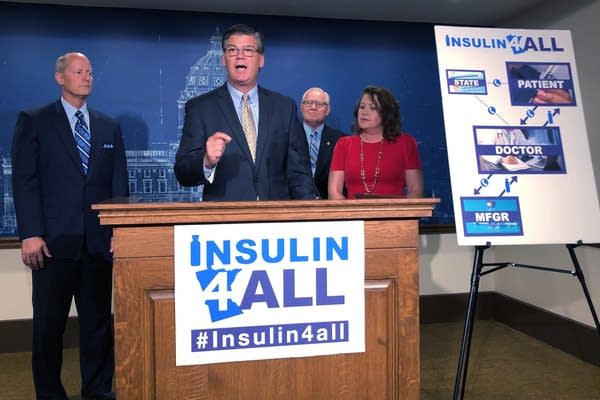Senate Republicans propose insulin plan

Republicans in the Minnesota Senate Thursday proposed a new way of getting expensive insulin to people who can’t afford it. Their plan would require manufacturers to supply physicians with adequate amounts of insulin at no cost.
Lawmakers on both sides of the aisle have been wrestling with insulin access and affordability since the end of the 2019 session, when a House DFL-crafted proposal failed to become law.
Sen. Eric Pratt, R-Prior Lake, said the new proposal, called the Minnesota Insulin Patient Assistance Program, would help people in need.
“We recognize that Minnesotans are struggling to afford insulin, and I believe that we have a plan here that will help fix that.”
Create a More Connected Minnesota
MPR News is your trusted resource for the news you need. With your support, MPR News brings accessible, courageous journalism and authentic conversation to everyone - free of paywalls and barriers. Your gift makes a difference.
Under the proposal, insulin manufacturers would have a new state licensing requirement to supply their product to physicians at no cost. The physicians would then provide free insulin to eligible patients with diabetes. People could qualify if they're not already on a public program such as Medicare, Medicaid or MinnesotaCare, and their family income is less than 400 percent of the federal poverty line.
Pratt said that puts the cap for individuals at around $50,000, and around $100,000 for a family of four.
“This allows someone to get a stable supply of insulin for up to a year before they have to requalify,” Pratt said, adding that the plan requires a financial stake from drug companies, which is something DFL Gov. Tim Walz and House Democrats have insisted upon. The cost to those companies, as well as the state, has not yet been calculated.
Pratt said the Senate plan could be up and running by Jan. 1, provided the governor calls a special session to pass the bill.
“I want to encourage the governor and the House Democrats to engage with us, to have this conversation and to bring this forward, so we can get it implemented as quickly as possible.”
A spokesman for Walz said the governor was reviewing the proposal and looked forward to continued discussion.
A committee hearing on the Senate proposal is planned for Monday. The House will hold a hearing next Thursday on a revised version of last session’s DFL bill.
Rep. Mike Howard, DFL-Richfield, the chief sponsor of last session’s Alec Smith Emergency Insulin Act, said he is concerned that the Senate plan could waste valuable time in determining a person’s eligibility. Howard said he wants legislation that sets up an emergency program.
“Folks that are in a crisis, they can’t wait a week or two to get their supply of insulin. It’s life-necessary. And as I understand their program, I’m not certain that it would allow for folks in a true emergency to access insulin when they need it.”
A lobbyist for the pharmaceutical industry said insulin should be affordable, but suggested the problem lies with insurers, not drug manufacturers.
“Rather than creating a duplicative new state-run program, we believe efforts should be focused on fixing a broken system that’s asking patients to pay a higher price for insulin than their insurance company,” said PhRMA spokesman Nick McGee. “We hope to work with lawmakers to change the system so that patients get the same discounts their insurers do and no patient has to worry about affording their insulin or any other medicine.”
One of the state's leading advocates for insulin access and affordability offered a mixed critique of the Senate plan. Quinn Nystrom of the group MN Insulin4all said she was glad to see the Senate proposal but disappointed that her organization wasn’t consulted.
“I’ll take what I can get. To me, what our group’s priority is, saving lives,” Nystrom said. “So, it seems like they’re genuine in their attempt to want to work together and want to try to save people’s lives. That’s our group’s goal.”